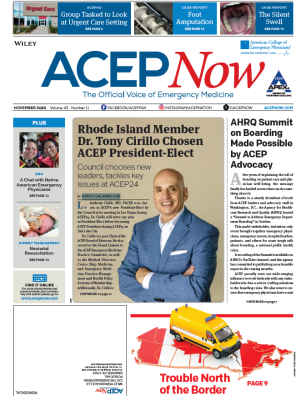
The profession of medicine is one of the most highly-regulated industries in the country. While we can advocate for emergency physicians through our professional organizations, several emergency physicians have taken it upon themselves to enter the political arena. Here, we profile the emergency physicians running for Congress in the 2022 cycle as they answer questions posed by ACEP Now.
Explore This Issue
ACEP Now: Vol 41 – No 09 – September 2022Representative Raul Ruiz, MD
Twitter: @repraulruizmd
What do you think emergency physicians need to be paying attention to in Congress?
Dr. Ruiz: One is the reversal of Roe v. Wade. And why is that important? It’s important because in many states you’ll start to see the criminalization of medical practices. In some states and in Congress already there have been attempts to be able to imprison OB/GYN physicians or fine them extraordinary amount of monies or bar them from practicing with their license for a medical procedure, whether it’s done for an emergency or for other reasons. Some bills that the Republicans try to pass through the House would also deputize technicians, nurses, and anybody that works in a clinic or hospital to bring charges up against physicians. Now that’s very concerning.
What do you think we should be doing about medical school debt in this country?
Dr. Ruiz: Obviously, the cost of a medical school has gone extremely high. So, we need to figure out a way where we can reduce those costs. Also, there’s a lot of loan to scholarship opportunities that we need to create in order for individuals who may initially take out a loan to pay for their medical school.
And if they fulfill certain requirements, whether practicing in a medically underserved area or whether their practice serves over 60% Medicare and Medicaid patients, or whether they actually take on certain community service hours in their practice, or sign into some kind of program with a government that focuses on equity, then those loans can be converted into scholarships and there would be no need to pay them back.
How can we improve our approach to future pandemics and public health threats?
Dr. Ruiz: One of the factors that we need to improve is the ability for the CDC to collect data so that they can in real time, through either surveillance, through emergency department or hospital or state public health department reporting be able to act on that data much quicker and make better targeted decisions in terms of the precautions that are necessary. Right now, it’s a hodgepodge. They have to join into over 200 data use agreements with counties [and] with states. Some entire states don’t even report data. Some states leave it for their individual counties to form these data use agreements. And then some states do it as a state entity.
That is not efficient. That is not good. And the scientists [need to] know that our decisions and strategies are based on accurate information and accurate assumptions, as well.
The other thing that we need to really focus on is modernization of that data, standardization of that data, and making it efficient through electronic records to provide that data to the CDC, without burdening physicians. The second issue is focusing on our workforce. We need to bolster our supply of epidemiologists. We need to bolster our supply of community health workers, our public health workers, to be in the field, to collect data, to provide the programs that are necessary in order to combat this pandemic.
Representative Rich McCormick, MD
Twitter: @richforga
Why did you decide to run for Congress in the first place?
Dr. McCormick: What originally got me in into this fight was going down to the state capitol with the Medical Association of Georgia, which is a bipartisan group of doctors that were just trying to solve a problem with surprise billing. I went down there and actually got mad at my own party. Some people that were blocking good legislation backed by patient advocacy groups and backed by a bipartisan group of doctors just trying to do the right thing for the patient. We realized that there was something to be done. And they asked if I’d be willing to run. And it kind of cascaded from there. Originally, I was asked to run for state senator, but that very quickly escalated. And it’s amazing to have a guy who literally had no background in politics—no connections, didn’t know one politician three years ago—to now be the nomination for one of the most hotly contested races in America.
How do you view ACEP’s policy on firearm safety and injury prevention, which includes universal background checks for all firearm transactions, including private sales and transfers.
Dr. McCormick: We can’t avoid the fact that this is a mental health issue. This is a parenting issue. This is a schooling issue. This is a cultural issue. Making a law is not going solve that.
We have a much deeper problem in America than our laws, but we have a real mental health crisis that we need to address because quite frankly, that’s where most of gun deaths come from: suicides.
How are you best suited to solve our nation’s problems in Congress?
Dr. McCormick: I can be best used and bring my very unique skill set of 20 years of military service. I’ve served with the Marines, the Army, and the Navy, and I’m from an Air Force family. I’m a third-generation military pilot. I bring a lot of experience when it comes to medicine. I’m married to an oncologist who is much smarter and more experienced than I am, but I’m also an ER doc, which is kind of the conduit to all of medicine.
If you look at the two biggest items of spending in the government, it’s the military and health care. I bring a unique skill set to Congress that I think will be applicable, especially somebody who’s literally practicing medicine. I get to witness failed policy regularly and see how we can address that. My wife has to deal with pre approvals and drug pricing, monopolistic practices and pharmaceutical and insurance problems all the time, so I get to hear about it in real time. Quite frankly, this is the one race that we really have almost certainly going to have a doctor coming into the doctor’s caucus. That’s going to be a unique opportunity for another physician to be added to the doctor’s caucus.
Representative Mark Green, MD
Twitter: @repmarkgreen
What do you think your greatest accomplishment has been that has benefited emergency physicians?
Dr. Green: I basically gave the economics of emergency medicine, the economics of health care lecture to the entire Republican caucus. Because they were really going in the wrong direction. On balance billing and collective bargaining and some of the issues that hit us as emergency physicians, we really saved the No Surprises Act because they were going to put the power all in the insurance companies’ hands. By explaining how cost shifting works and the basic economics of contract medicine in a hospital, I was able to move the Republicans away from their stand and we went with the bill that was more New York style with arbitration. The problem was, of course, that the administration interpreted it incorrectly. Fortunately, a lawsuit in Texas recognizes that the intent of Congress was significantly different than the way Health and Human Services interpreted it. So, it’s still working its way through the courts. We’ll get it fixed. But, keeping that from going in the wrong direction was probably the biggest accomplishment that impacts emergency physicians that I’ve had in Congress.
What do you think that emergency physicians should be paying attention to in Congress right now that we aren’t focused on?
Dr. Green: Saving rural hospitals and then allowing rural freestanding emergency departments. That bill will continue to come up until we’re [Republicans] in charge. Nancy Pelosi’s just not been allowed to solve that problem, if you’re more than 35 miles from another ER a freestanding ER can’t bill CMS for Medicare and Medicaid. So, I’m trying to get that removed because when a rural hospital closes, we’ll get at least keep the ER as a freestanding ER.
Maybe a business model would be that the rural hospital becomes a freestanding ER and a nursing home or something like that. That way you keep the jobs in the rural community and you keep some emergency medicine coverage in that rural community. I’ve run this bill every year that I’ve been in Congress and I can’t get with a Democrat co-sponsor. I can’t get Nancy [Pelosi] to let the bill be heard.
You founded a hospital ED physician group in Tennessee. Can you tell me more about that? The trend right now is of independent physician groups apparently being swallowed up by either hospitals or by investor groups. And I was wondering what your thoughts are about that.
Dr. Green: I founded [the company] and we grew the company up to 52 contracts in 11 states when I left. We had about 1,000 clinicians when I sold the company. The way I did it was the physicians owned the net revenue from their local facility. It was almost like a franchise and I believe the company that took it over from me continued to do that. The company that took it over from me was American Physician Partners. I like the idea of the doctor owning the upside of their business at their local place now. The advantage of having larger groups is you can negotiate better rates with the payers. You know, a small ER group of eight guys and gals working in their own ER goes to Blue Cross Blue Shield (BCBS). BCBS says you’re going to get 85 percent of Medicare on your reimbursement rates, whereas if you’ve got 75 ER docs then you might get 150 percent of Medicare from Blue Cross Blue Shield. If I was to do it again, I would probably try to find some way where there could be a coop or an association of independent groups so that they can negotiate together, but the laws are a little bit restrictive on how you can negotiate because antitrust. The turnover in the company was less than 2 percent. In fact, the only people that left the company for the first three years were asked to leave because they had customer service, patient satisfaction issues, or competency issues.
Representative Ronny Jackson
Twitter: @repronnyjackson
What do you think has been your greatest accomplishment since you’ve been in Congress that has benefited emergency physicians specifically?
Dr. Jackson: We helped one hospital in particular to get proper funds for the Provider Relief Fund, which actually was a big deal for them and it probably would have ended up basically collapsing without it. And then we had another hospital that we were able to make sure they kept their participation in the 340B drug processing program, which also would have been detrimental had they not. If you’re in a rural area of Texas like I am where I have 41 counties and 42,000 square miles, if you don’t take care of the rural hospitals and you don’t take care of emergency care for people in your district a lot of times they can’t get to another hospital because they’re just too far away. So, I think keeping our rural hospitals up and running, trying to do everything we can to prevent rural hospitals from collapsing, which is hard to do nowadays, I think has been my biggest contribution to emergency medicine since I’ve been in Congress.
I’ve seen recently a lot of burnout surveys, emergency medicine went from fourth or fifth burnout to being number one or number two spot this past year. What’s more stressful for you personally? Is it working in the ED or being in Congress?
Dr. Jackson: For me, it’s more stressful being in Congress. I spent 25 years as an emergency physician practicing emergency medicine. But I did most of that at urgent care centers.
Now that I’m in Congress and I’m talking to my civilian colleagues all the time, there are so many things they had to deal with that I didn’t have to deal in the military—the insurance companies, the hospitals, all the regulatory burden that was imposed upon them, the paperwork and the administrative burden. In the military and the Navy in particular, we just took care of the patients and we didn’t worry about where the payment was coming from or anything else.
We got paid the same no matter what we did, you know, and I just think that it wasn’t as stressful for me having practiced in the military is as it is for my civilian colleagues. So, I can imagine after talking to a lot of my colleagues, it would probably be more stressful to practice in that environment than being Congress.
What is it like being the White House physician?
Dr. Jackson: I did 14 years of my active-duty career at the White House and I took care of President Bush, President Obama, and President Trump. I was there for the last three years of the Bush administration, all eight years of the Obama administration, and then the first three years of the Trump administration. But the impact I think I had there and the way I think I changed things as I kind of changed the way that we approached medicine at the White House. If you look at what the White House physician does on a day-to-day basis, it’s about probably 30 percent primary care and about 70 percent contingency planning. If everything goes well, you’re not going to be doing a lot, but you’re planning for everything, you’re planning for that bad day. What happens if the President takes a round to the chest? What happens if an IED hits a motorcade, or if the President has a stroke or a heart attack? So, it’s just contingency planning and there’s no better person in medicine to be responsible for that, especially for our head of state and our commander-in-chief, than an emergency physician.
 Dr. Dark (@RealCedricDark) is assistant professor of emergency medicine at Baylor College of Medicine and the medical editor in chief of ACEP Now.
Dr. Dark (@RealCedricDark) is assistant professor of emergency medicine at Baylor College of Medicine and the medical editor in chief of ACEP Now.


No Responses to “Emergency Physicians Running for Congress in 2022”